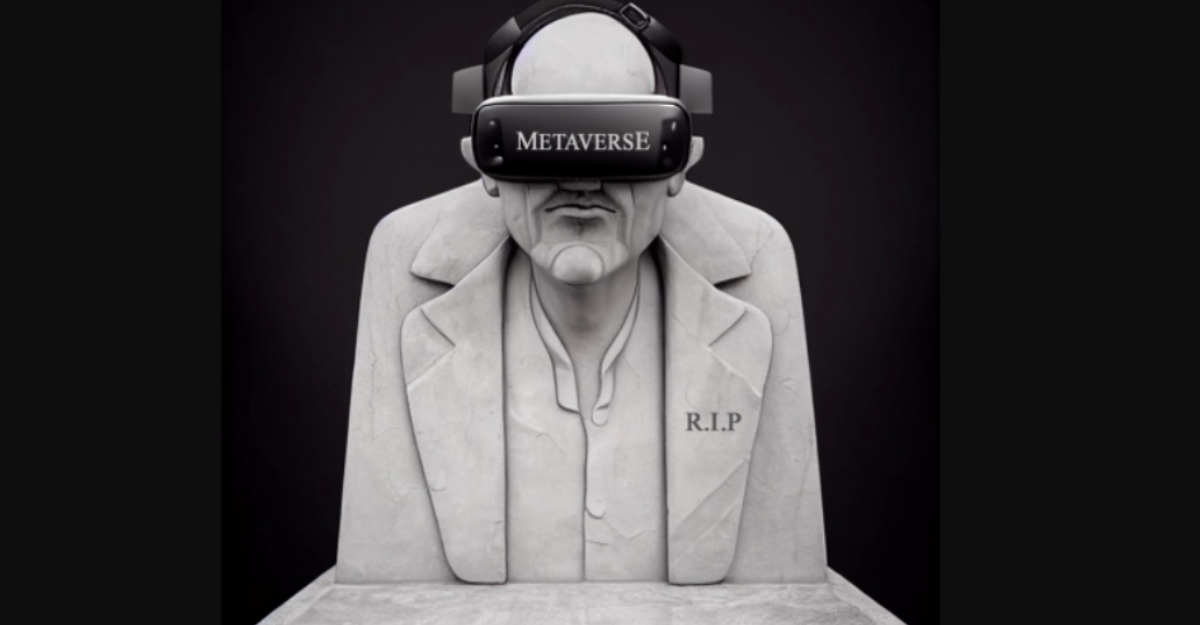“The next chapter of the Internet.”
“The successor to the mobile Internet.”
“It will have the ability to support many, many millions of jobs.”
“You will be able to teleport instantly as a hologram to be at the office without a commute, at a concert with friends, or in your parents’ living room to catch up.”
These are the many unrealistic dreams Meta CEO Mark Zuckerberg has for the metaverse but can these dreams actually be realised?
Back in October 2021, Facebook rebranded into Meta to reflect its expanding ambitions to conquer the metaverse.
But looking at how its virtual platform Horizon Worlds is failing to retain users — with only one in 10 returning to the virtual platform after a month — it’s hard to see how Zuckerberg can manage to transform the world with the highly-raved tech.
Since Meta’s rebranding, interest in the metaverse has also progressively dwindled. Nobody is really interested in the metaverse anymore, especially after the rise of artificial intelligence (AI). In fact, search traffic for the word ‘metaverse’ globally has declined by about 80 per cent over the past year.
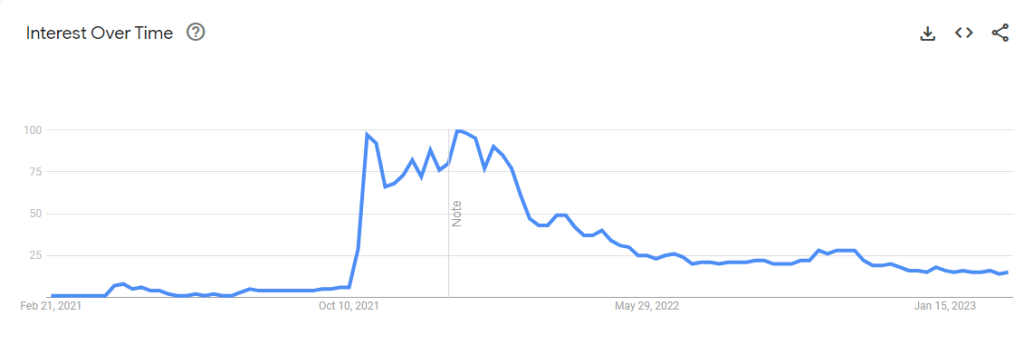
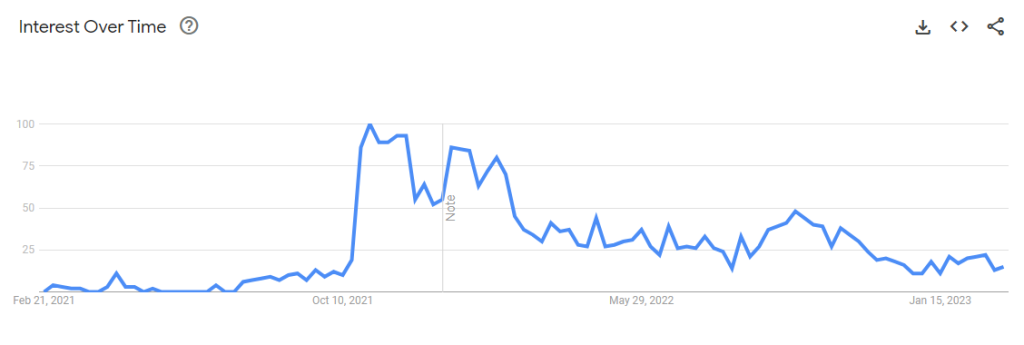
The declining interest in the metaverse is evident among Singaporeans as well, with the interest in the metaverse reaching its peak around the time Meta announced its rebrand, before steadily falling.
Mark Zuckerberg quietly buried the metaverse

Be that as it may, it’s not to say that Zuckerberg did not put in any effort into developing the metaverse. Meta has poured billions into the development and creation of the metaverse since 2021, headstrong on pushing it out for global adoption in a decade or so.
In 2022, the company’s VR and AR division Reality Labs generated a revenue of almost US$2.2 billion, crowning Meta as one of the biggest metaverse players globally.
While this may seem like an accomplishment, Reality Labs actually generated an operating loss of US$13.7 billion at the same time, which means that the company is spending way more money than it’s making.
This amount is in addition to an operating loss of US$10.2 billion for Reality Labs in 2021, which adds up to a two-year operating loss of US$23.9 billion. During this timeframe, Meta has generated metaverse-related revenue of just US$4.4 billion.
What makes this worse is that Meta’s Reality Labs isn’t growing. In fact, its revenue had dropped by five per cent in 2022 as compared to the previous year.
The shares of the company had also tanked, falling to the lowest level since 2016 last year, as investors lose confidence in Meta.

Raking in loss after loss, reality finally hit Zuckerberg — the CEO decided to quietly bury the metaverse earlier this month by turning his attention to the next big, shiny thing: AI.
“We’re starting by pulling together a lot of the teams working on generative AI across the company into one group focused on building delightful experiences around this technology into all of our different products,” Zuckerberg wrote on Facebook, essentially giving up on his metaverse dreams.
But what even is the metaverse?

Zuckerberg was hellbent on making the metaverse work, but funnily enough, nobody truly knows what the metaverse is.
The idea of the metaverse is still so nascent that people are still trying to figure out how to define the virtual platform — which was exactly why Zuckerberg’s dream of realising the metaverse was doomed to fail.
Even Google can’t help. Googling the term ‘metaverse’ brings you several distinct definitions of the metaverse — so which one of these is the “correct” definition of the metaverse?
That said, the general consensus around the metaverse is that the virtual platform would have two important characteristics. Firstly, it is an interconnected digital space which allows people to have life-like interactions, be it personal or professional.
Secondly, the digital space that the metaverse provides must be immersive, pushing technology to beyond what it is today, usually in the form of a 3D-enabled space to add a touch of realism in the space. To create this immersion, physical tools such as VR headsets and goggles can aid in substituting a user’s real senses.

Eventually, the endgame for the metaverse is for virtual worlds to exist seamlessly alongside the real world.
An all-encompassing, immersive metaverse is still a faraway target

Despite the decades spent into developing the metaverse, the hardware and software needed to run the digital space at its intended scale is still far from finished.
Tommaso Di Bartolo, a faculty member at UC Berkeley, believes that an all-encompassing, immersive metaverse is still a faraway target. This is because it would require a combination of “5G, AI, next-gen processors, Quantum Computing, Edge Computing, AR, and VR, but as of right now, however, these technologies are not advanced enough to scale en masse at an affordable price”.
VR devices in the market today are lacking in many aspects, and are far from being able to provide a truly immersive experience.
Although recent developments such as facial and body movement tracking are providing users with a better experience, these devices still cannot replicate basic aspects of the human experience, such as physical touch.
Even the graphics in Meta’s Horizon Worlds has gotten flak from users for looking too simplistic when virtual reality games such as Second Life can provide its users with better graphics, despite being launched years before Zuckerberg decided to focus on developing the metaverse. Not to mention, even Meta’s own employees are reportedly not utilising Horizon Worlds.
Besides these issues, the metaverse also currently lacks interoperability between different metaverse platforms, an essential component to creating a fully immersive virtual experience.
By establishing a commonly accepted set of standards, we can create bridges between various creators and users in the metaverse, but sadly, efforts towards interoperability in the metaverse are still in infancy stages.
The metaverse was overhyped way before its time
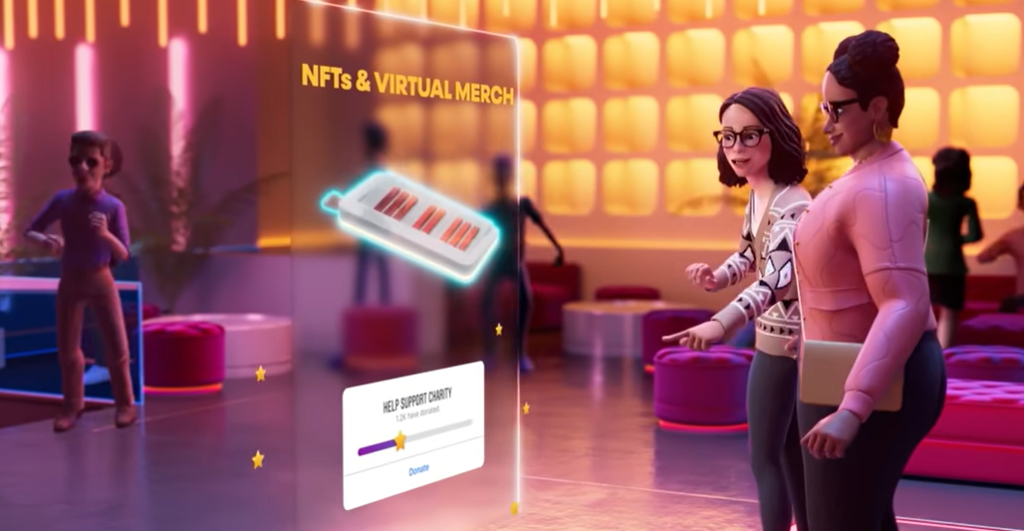
Considering that the tech and structural considerations to successfully implement the metaverse feasibly, the hype created surrounding the metaverse these past two years have only set up the concept for failure.
Zuckerberg was at the forefront of this hype, after his announcement of Facebook’s rebranding. The word ‘metaverse’ has been thrown around way too easily the past two years, creating unrealistic hype around the concept.
For instance, during the Meta Connect conference in 2021, Zuckerberg showed off an extravagant what-if video, depicting the possibilities of the metaverse. In the video, two friends attended a Jon Batiste concert together — one in real life, and one through ‘metaverse glasses’ with apparently no difference between their experiences.
But this is far off from the reality we have today.
Zuckerberg is not the only one to blame for creating this overpromising, unrealistic hype. The past two years have seen the likes of Microsoft and Google joining the metaverse race, coming up with their own platforms such as Microsoft Mesh and putting out new AR and VR devices.
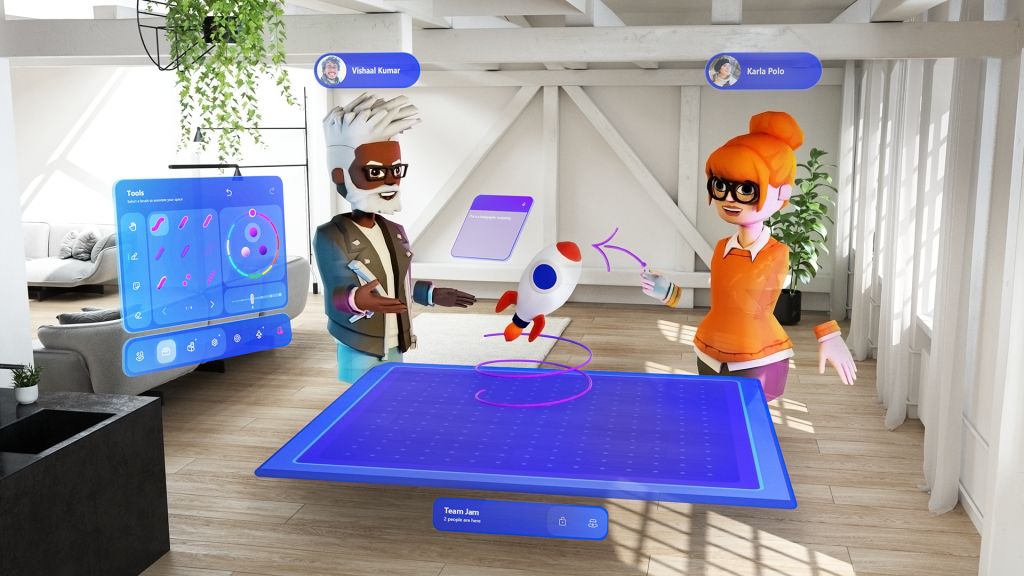
Last year, the executive chairman and CEO of Microsoft, Satya Nadella, claimed that the metaverse is already here, “not only transforming how we see the world, but how we participate in it – from the factory floor to the meeting room”.
Big brand names have also been riding the waves of the metaverse hype during this time by incorporating it in their marketing strategies to generate buzz around their products and services.
Inevitably, the hype surrounding the metaverse has built up unattainable expectations within consumers.
So when Zuckerberg and many other metaverse platforms failed to deliver products that match these expectations, users naturally lost interest in the tech, bursting the hype bubble surrounding the metaverse.
For instance, besides Horizon Worlds, popular metaverse platform Decentraland reportedly only has 8,000 users on average per day, according to its creative director Sam Hamilton, while The Sandbox claims that it has 32,000 active users — a far cry from achieving global adoption anytime soon.
Can the metaverse bounce back?

Gartner Inc expects that 25 per cent of people globally would spend at least an hour a day in the metaverse for work, shopping, education, and entertainment by 2026.
However, an overwhelming 46 per cent of industry experts have cast their doubts on the feasibility of the global adoption of the metaverse by 2040, according to a report done by Pew Research Center.
These industry experts believe that the technology needed to implement an immersive metaverse will still not be achievable by that time. Considering the current state of the metaverse, some even believe that the metaverse will not have much use in daily life.
Mark Crowley, an assistant professor of computer engineering at the University of Waterloo said, “The real world is far richer and more important than virtual reality and it always will be. I believe the limiting factor to fully immersive activities will be that they are unnecessary.”
On the flip side, supporters of the metaverse believe that it would provide a new reality for humans — one that can even “improve the physical world for humans”.
That being said, the buzz surrounding the metaverse has been killed off especially after the rise of generative AI. But this doesn’t mean that the concept of the metaverse will fade away forever.
A clear example of this is the decades-old field of AI, which is known for going through multiple winters when people doubted the prospects of the tech. Today, however, AI is definitely disrupting and revolutionising various industries — and this may be the case for the metaverse as well.
Nevertheless, the current state of the metaverse suggests that it is still far from alive.
Featured Image Credit: Louis Rosenberg via MidJourney
